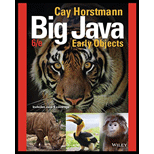
Big Java, Binder Ready Version: Early Objects
6th Edition
ISBN: 9781119056447
Author: Cay S. Horstmann
Publisher: WILEY
expand_more
expand_more
format_list_bulleted
Question
Chapter 16, Problem 11PP
Program Plan Intro
A method “merge()”
Program plan:
- In a file “LispList.java”, create a class “LispList”,
- Create an object for “EmptyList”.
- Declare the method “isEmpty()”.
- Declare the method “head()”.
- Declare the method “tail()”.
- Declare the method “cons()”.
- Declare the method “merge()”.
- In a file “EmptyList.java”, create a class “EmptyList”,
- Define the default constructor.
- Define the “cons()” method to return the object of “NonEmptyList”.
- Define the method “isEmpty()” to returns true.
- Define the method “merge()” that returns object that are passed to this function as an argument.
- Define the method “head()” that returns an exception “UnsupportedOperationException”.
- Define the method “tail()” that returns an exception “UnsupportedOperationException”.
- Define the method “toString()” that returns empty string.
- In a file “NonEmptyList.java”, create a class “NonEmptyList”,
- Declare the object for “Object” and “LispList”.
- Define the constructor that assigns the object properties.
- Define the “cons()” method to return the object of “NonEmptyList”.
- Define the method “isEmpty()” that returns false.
- Define the method “merge()”,
- Return the object created for “NonEmptyList”.
- Define the method “head()” that returns the object properties of “Object”.
- Define the method “tail()” that returns the object properties of “LispList”.
- Define the method “toString()” that returns the string representation.
- Return the object created for “NonEmptyList”.
- In a file “LispListTest.java”, create a class “LispListTest”,
- Define the method “main()”,
- Create an object for “EmptyList” to create list “1”..
- Create an object for “NonEmptyList” to create list “2’.
- Assign the value returned from the method “cons()” to the list “3”.
- Create the fourth list with the value returned from the method “merge()” that merges list “3” and “2”.
- Print the actual list “4” and then the expected list “4”.
- Print the actual output of merging List “2” and “3” and then the expected output.
- Print the actual output of merging List “1” and “2” and then the expected output.
- Print the actual output of merging List “2” and “1” and then the expected output.
- Print the actual output of merging List “2” and “2” and then the expected output.
- Print the actual output of merging List “1” and “1” and then the expected output.
- Define the method “main()”,
Expert Solution & Answer
Want to see the full answer?
Check out a sample textbook solution
Chapter 16 Solutions
Big Java, Binder Ready Version: Early Objects
Ch. 16.1 - Prob. 1SCCh. 16.1 - Prob. 2SCCh. 16.1 - Prob. 3SCCh. 16.1 - Prob. 4SCCh. 16.1 - Prob. 5SCCh. 16.1 - Prob. 6SCCh. 16.1 - Prob. 7SCCh. 16.2 - Prob. 8SCCh. 16.2 - Prob. 9SCCh. 16.2 - Prob. 10SC
Ch. 16.2 - Prob. 11SCCh. 16.2 - Prob. 12SCCh. 16.3 - Prob. 13SCCh. 16.3 - Prob. 14SCCh. 16.3 - Prob. 15SCCh. 16.3 - Prob. 16SCCh. 16.3 - Prob. 17SCCh. 16.3 - Prob. 18SCCh. 16.4 - Prob. 19SCCh. 16.4 - Prob. 20SCCh. 16.4 - Prob. 21SCCh. 16.4 - Prob. 22SCCh. 16.4 - Prob. 23SCCh. 16.4 - Prob. 24SCCh. 16 - Prob. 1RECh. 16 - Prob. 2RECh. 16 - Prob. 3RECh. 16 - Prob. 4RECh. 16 - Prob. 5RECh. 16 - Prob. 6RECh. 16 - Prob. 7RECh. 16 - Prob. 8RECh. 16 - Prob. 9RECh. 16 - Prob. 10RECh. 16 - Prob. 11RECh. 16 - Prob. 12RECh. 16 - Prob. 13RECh. 16 - Prob. 14RECh. 16 - Prob. 15RECh. 16 - Prob. 16RECh. 16 - Prob. 17RECh. 16 - Prob. 18RECh. 16 - Prob. 19RECh. 16 - Prob. 20RECh. 16 - Prob. 21RECh. 16 - Prob. 22RECh. 16 - Prob. 23RECh. 16 - Prob. 24RECh. 16 - Prob. 25RECh. 16 - Prob. 26RECh. 16 - Prob. 1PECh. 16 - Prob. 2PECh. 16 - Prob. 3PECh. 16 - Prob. 4PECh. 16 - Prob. 5PECh. 16 - Prob. 6PECh. 16 - Prob. 7PECh. 16 - Prob. 8PECh. 16 - Prob. 9PECh. 16 - Prob. 10PECh. 16 - Prob. 11PECh. 16 - Prob. 12PECh. 16 - Prob. 13PECh. 16 - Prob. 14PECh. 16 - Prob. 15PECh. 16 - Prob. 16PECh. 16 - Prob. 17PECh. 16 - Prob. 18PECh. 16 - Prob. 19PECh. 16 - Prob. 20PECh. 16 - Prob. 21PECh. 16 - Prob. 1PPCh. 16 - Prob. 2PPCh. 16 - Prob. 3PPCh. 16 - Prob. 4PPCh. 16 - Prob. 5PPCh. 16 - Prob. 6PPCh. 16 - Prob. 7PPCh. 16 - Prob. 8PPCh. 16 - Prob. 9PPCh. 16 - Prob. 10PPCh. 16 - Prob. 11PPCh. 16 - Prob. 12PPCh. 16 - Prob. 13PPCh. 16 - Prob. 14PPCh. 16 - Prob. 15PPCh. 16 - Prob. 16PPCh. 16 - Prob. 17PP
Knowledge Booster
Recommended textbooks for you
 Database System ConceptsComputer ScienceISBN:9780078022159Author:Abraham Silberschatz Professor, Henry F. Korth, S. SudarshanPublisher:McGraw-Hill Education
Database System ConceptsComputer ScienceISBN:9780078022159Author:Abraham Silberschatz Professor, Henry F. Korth, S. SudarshanPublisher:McGraw-Hill Education Starting Out with Python (4th Edition)Computer ScienceISBN:9780134444321Author:Tony GaddisPublisher:PEARSON
Starting Out with Python (4th Edition)Computer ScienceISBN:9780134444321Author:Tony GaddisPublisher:PEARSON Digital Fundamentals (11th Edition)Computer ScienceISBN:9780132737968Author:Thomas L. FloydPublisher:PEARSON
Digital Fundamentals (11th Edition)Computer ScienceISBN:9780132737968Author:Thomas L. FloydPublisher:PEARSON C How to Program (8th Edition)Computer ScienceISBN:9780133976892Author:Paul J. Deitel, Harvey DeitelPublisher:PEARSON
C How to Program (8th Edition)Computer ScienceISBN:9780133976892Author:Paul J. Deitel, Harvey DeitelPublisher:PEARSON Database Systems: Design, Implementation, & Manag...Computer ScienceISBN:9781337627900Author:Carlos Coronel, Steven MorrisPublisher:Cengage Learning
Database Systems: Design, Implementation, & Manag...Computer ScienceISBN:9781337627900Author:Carlos Coronel, Steven MorrisPublisher:Cengage Learning Programmable Logic ControllersComputer ScienceISBN:9780073373843Author:Frank D. PetruzellaPublisher:McGraw-Hill Education
Programmable Logic ControllersComputer ScienceISBN:9780073373843Author:Frank D. PetruzellaPublisher:McGraw-Hill Education

Database System Concepts
Computer Science
ISBN:9780078022159
Author:Abraham Silberschatz Professor, Henry F. Korth, S. Sudarshan
Publisher:McGraw-Hill Education

Starting Out with Python (4th Edition)
Computer Science
ISBN:9780134444321
Author:Tony Gaddis
Publisher:PEARSON

Digital Fundamentals (11th Edition)
Computer Science
ISBN:9780132737968
Author:Thomas L. Floyd
Publisher:PEARSON

C How to Program (8th Edition)
Computer Science
ISBN:9780133976892
Author:Paul J. Deitel, Harvey Deitel
Publisher:PEARSON

Database Systems: Design, Implementation, & Manag...
Computer Science
ISBN:9781337627900
Author:Carlos Coronel, Steven Morris
Publisher:Cengage Learning

Programmable Logic Controllers
Computer Science
ISBN:9780073373843
Author:Frank D. Petruzella
Publisher:McGraw-Hill Education